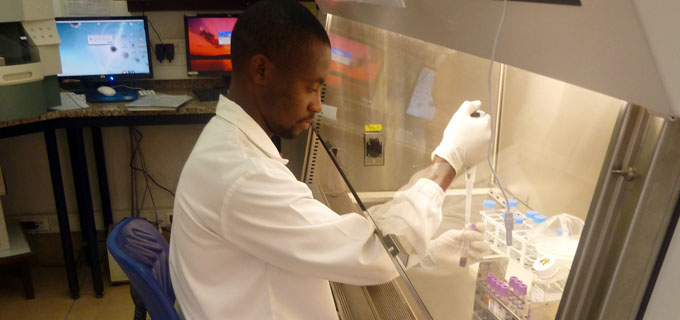GAMA
Development of Novel Gastrointestinal Biomarkers for Use in HIV Incidence Determination in a Sub-Saharan African Setting

The earliest phase of HIV infection is clinically important in determining the natural history of disease. It is also the moment in which much of the immune damage occurs and constitutes the most infectious stage of the infection. Development of a test which could distinguish between individuals with early or longstanding HIV infection could potentially be used for clinical management, but would also allow the estimation of an HIV incidence rate.
The primary aim of GAMA is to gain a better understanding of dynamics of biomarkers of gastrointestinal inflammation during the first year of HIV infection as compared to chronic infection. The tremendous damage inflicted on the gut-associated lymphoid tissue during early HIV infection may provide the opportunity to identify biomarkers which present altered expression during the early phases of HIV infection. GAMA will assess the utility of these markers for identifying recent HIV infection as well as for potential associations with progression to AIDS. Understanding the dynamics of these biomarkers and associating them with standard serological responses during early HIV infection may reveal specific changes in expression patterns of biomarkers which are able to distinguish early from longstanding HIV infection.
Development of an assay for measuring HIV incidence would facilitate the evaluation of ongoing prevention programs as well as the design and implementation of trials to evaluate new prevention interventions.
Project Funders
Main Funders: Bill & Mellinda Gates Foundation
Co-funding: Ministry of Economy and Competitiveness. Government of Spain
Our Team
Principal Investigator (PI)
-
Denise Suzanne Naniche
Altres projectes
Veure projectes passatsCOMBACTE
Combatent la Resistència Bacteriana a Europa
Desenvolupament d'estratègies per a l'Eradicació de la Malaltia de Pian
Eradicació del Pian
Novel Marine Biomolecules against Biofilm (NoMorFilm)
Application to medical devices
COMBACTE-CARE
Combatting Bacterial Resistance in Europe - Carbapenem Resistance
MAMAH
Improving Maternal and Infant Health by reducing malaria risks in African women: evaluation of the safety and efficacy of dihydroartemisinin-piperaquine for intermittent preventive treatment of malaria in HIV-infected pregnant women
PreFIT
Predicting the Future: Incipient Tuberculosis
Predicting the Future: Incipient Tuberculosis
Encuesta serológica Cendea de Cizur
Cendea de Cizur
Projecte de Recerca en Resposta Immunitària i Epidemiologia de Malalties Infeccioses
Conèixer la propagació. Entendre la protecció
ANTICOV
Large Clinical Trial in Africa on the Treatment of Mild Cases of COVID-19
Stool4TB
Evaluating a new stool based qPCR for diagnosis of tuberculosis in children and people living with HIV
TB-RECONNECT
Reconnecting Transmission to Global Tuberculosis Control by Mapping Pathogen Transmission Events to Host Infection Status
SToolNIH
Quantifiable stool-based TB PCR to Improve Diagnostics and Treatment Monitoring
ALIA - Las ciudades y la salud
Planificación urbana, medio ambiente y salud | Clima y salud | Resistencias Antimicrobianas
END-VOC
ENDing COVID-19 Variants Of concern through Cohort studies (END-VOC)
TwinAir
Digital Twins Enabled Indoor Air Quality Management for Healthy Living
Estudio de la propagación de bacterias y genes de resistencia a los antibióticos en el ciclo integral del agua, en el área metropolitana de Barcelona
Propagación de la resistencia en aguas
Nuevos complejos de oro (III) frente a bacterias multirresistentes
Project Code: DTS21/00004
Desarrollo de dos nuevas estrategias terapéuticas (inhibidores de bombas de expulsion y ARN antisentido) activos frente a bacterias mutliresistentes
Más allá de la supresión vírica del VIH: un cuarto noventa para mejorar la salud de personas viviendo con el VIH en España
Project Code: PI20/01654
ENDÈMIC
Community knowledge generation through scientific culture, urban ecology and art
EpiGen
Building Scalable Pathogen Genomic Epidemiology in Ethiopia
Hepatitis C Free Baleares
Eliminating hepatitis C on the Balearic Islands (Mallorca, Menorca and Ibiza): a study in governmental and non-governmental addiction service centres, a mobile methadone unit and a prison to test and link people who use drugs to HCV care.
FLAVOBAC
Nuevas moléculas de oro coordinadas con flavonoides contra bacterias patógenas multirresistentes prioritarias
Evaluación de la eficacia del ácido acetilsalicílico a dosis bajas en la prevención de los efectos maternos y perinatales adversos en mujeres embarazadas infectadas por el SARS-CoV-2
INTE-AFRICA
Integrating and decentralizing diabetes and hypertension services in Africa




